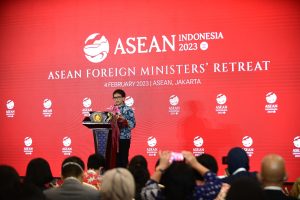From pandemic and economic slowdown to climate change and food and energy shortages, our world is in an age of turbulence.
Unfortunately, the mood is not jubilant for international cooperation now. Great power rivalry and the war in Ukraine have polarized the world into opposing blocs. Trust deficits between countries are pervasive and zero-sum thinking proliferates. Countries are trading blame rather than working together.
These trends, just like COVID-19, are infectious. The Indo-Pacific, where the interests of the world’s biggest countries intersect and clash, is not immune. We see unnecessary military projection and intensifying competition for influence between the major powers in the region.
Indonesia refuses to see the Indo-Pacific fall victim to geopolitical confrontation. We cannot risk its potential as the largest contributor to global growth for the next 30 years. An open conflict where 60 percent of the world’s population resides and the arteries of global trade are located would be catastrophic for the whole world.
This is where Indonesia’s independent and active foreign policy becomes relevant. For almost eight decades, these principles have been a compass for Indonesia in interacting with other nations.
Independence Does Not Mean Disengagement
Our independent and active foreign policy does not mean neutrality and disengagement. Instead, it places great emphasis on an active role and engagement with all countries, guided by strategic autonomy and firm adherence to international law. In other words, Indonesia’s independent and active foreign policy is not a neutral policy; it is one that does not align with the superpowers nor does it bind the country to any military pact.
With this compass, Indonesia successfully led the G-20 last year and the ASEAN summit and related summits this year amid enormous geopolitical challenges, bridging widely divergent views. It actively advocates for the war in Ukraine to end while refusing being forced to choose a side.
Especially through ASEAN, Indonesia has been working hard to mainstream the core values of its independent and active foreign policy to keep peace and stability in the region.
Indonesia believes in the primacy of international law and the U.N. Charter, including as the great equalizer among nations and protection against the rule of might. They work if we apply them consistently, and not only when we see fit.
“Every House Needs Rules”
To ensure order, every house needs rules. For the Indo-Pacific, the rules are clear: the Zone of Peace, Freedom, and Neutrality Declaration, the Treaty of Amity and Cooperation, and the Bali Principles. Every country should respect them in their engagement with the region.
It is crucial to develop an inclusive regional architecture. In ASEAN, we open our doors for cooperation with all countries.
Our region can only unlock its true potential if all its countries are given the opportunity to contribute meaningfully. Alienation and containment would only breed insecurity and resentment.
We need to mainstream the paradigm of collaboration. To create peace and prosperity, we must leave no room for mistrust and rivalry. Indonesia initiated the ASEAN Outlook on the Indo-Pacific to turn them into concrete cooperation that benefits our people.
United by Values
Indonesia sees in Germany a potential partner to promote these values. We may be geographically distant but we are closer and more alike than many would have thought.
Indonesia and Germany are partners with many shared values, including a commitment to democracy, human rights, and international law. We are both G-20 members and the largest countries in our respective regions. Our voices carry weight there and beyond.
A stronger partnership between Indonesia and Germany would send a strong message that there remains room for collaboration between developed and developing countries.
Indonesia expects Germany to serve as a positive force that reduces tension and builds confidence in the Indo-Pacific. At the same time, Germany’s support for ASEAN’s centrality in shaping regional dynamics would be most welcomed.
As the EU’s largest country, Germany’s support for the conclusion of the Indonesia-EU Comprehensive Economic Partnership Agreement is critical. We also seek its support for our right to development, including by investing in our downstream industries and eliminating discriminatory trade policies.
Our partnership must create a better world. We must collaborate to promote a green economy and combat climate change, including through the Green Infrastructure Initiative and the Just Energy Transition Partnership. Expanding cooperation through the Triple Win program in the labor sector can foster the exchange of skills and expertise. It can make Indonesian skilled workers contribute to Germany’s economy while gaining experience to enhance their own professional development.
A German proverb says: ‘Mit einem Freund im Dunkeln zu gehen ist besser als alleine im Licht zu gehen’ (Walking with a friend in the dark is better than walking alone in the light). So, let us walk together in this turbulent time.
This text is part of the Körber-Stiftung’s annual foreign policy publication The Berlin Pulse, including a representative survey.































